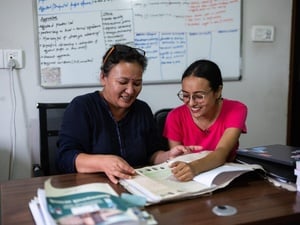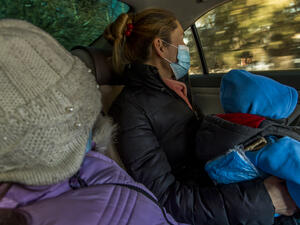Q&A: The world's 15 million stateless people need help
Q&A: The world's 15 million stateless people need help

Philippe Leclerc, Head of UNHCR's Statelessness Unit.
GENEVA, May 18 (UNHCR) - Philippe Leclerc has worked for the UNHCR for 17 years. For the last three years, he has headed the agency's small Statelessness Unit. Leclerc says this fascinating issue has not received the attention it deserves, but UNHCR is helping to slowly find solutions for the millions of stateless people around the world. He discussed his work this week with Web Editors Leo Dobbs and Haude Morel. Excerpts from the interview:
What is the definition of statelessness?
A stateless person is any person who is not considered as a national by any state through its nationality legislation or constitution.
How do people become stateless?
There are many root causes. One of the most well-known is when a state dissolves and separates into different states - that's called state succession. There are many examples ... like the dissolution of the Soviet Union, former Yugoslavia, the partition of East and West Pakistan, but also decolonisation processes where you have either individuals or large populations who remain without a nationality.
There are also more technical root causes, like conflicts of laws where an individual is born to a father and a mother of different nationalities and the legislation to grant nationality by the father and the mother is different. Sometimes it's through what is called jus soli, birth on the territory, or jus sanguinis, nationality through descent. And it may lead to statelessness when the two nationality legislations contradict each other.
You also have reasons like arbitrary deprivation of nationality by some states who change their nationality laws or decide that - for reasons that do not always accord with international law - a person should not be a citizen of the country anymore. Another reason is when birth registration does not take place systematically and so children are not registered, do not have a birth certificate and later on cannot prove their nationality.
In many states you still have discrimination affecting women who cannot transmit their nationality to their children.... Many states are revising their laws to provide for equality between mother and father in transmitting nationality. We're promoting this change to ensure that this cause of statelessness is eliminated.
What problems do stateless people face in their daily lives?
The situation of stateless people is very different from one country to another. In some countries they have rights, but usually they do not have rights. The first thing they are lacking is often just an identity and this can have dramatic consequences on daily life.
In some states, the person will not be able to go to school because he will not have proof of his identity and his parents will not be able to register him at school even though the Convention on the Rights of the Child provides that all children should have access to primary education free of charge. It will prevent individuals from owning property, signing contracts, getting an employment contract. In some situations, these people will not be able to marry without a specific authorization.
In many countries which emerged from the former Soviet Union, it is important not only to have a nationality but also to have your habitual residence registered. If you do not have a registered residence and a nationality, you will not have access to health services. Sometimes, people don't even know that they are stateless ... it's only when the person has health problems or employment problems that suddenly he or she discovers that he or she does not have a nationality, is not entitled to health insurance, health services.
How many stateless people are there in the world?
We are talking about estimates of around 15 million people throughout the world. One of the difficulties [in estimating numbers] is the identification of statelessness in countries who do not know who are their citizens, who are not their citizens. One concrete example is Nepal. Until recently we did not provide an estimate for the number of stateless persons in Nepal, even though we knew it was a phenomenon there. Now we talk about around 4 million stateless persons and already this year - because of the peace plan implementation [between the government and Maoist former rebels] - more than 2.2 million persons in Nepal have been issued citizenship certificates. UNHCR is monitoring the situation and trying to ensure that the rest do not fall into the cracks and that they will also be able to acquire citizenship.
In other countries, particularly in Africa and Asia, it is difficult for some states to do a population census, either because they have just emerged from civil war ... or because recent movements of refugees have not enabled these countries to register births and nationality. Identification of the number and scale of statelessness is one of the problems that we are trying to address.
Where are the main concentrations of stateless people?
The big concentration of stateless people is in Asia - Thailand, Nepal, Myanmar. You also have big populations of stateless people in the Middle East - the Bidoon in Kuwait, in the United Arab Emirates, some populations in Saudi Arabia and some Kurdish populations in Syria.
In Africa, there is the undetermined nationality of many people in Côte d'Ivoire as well as risks of statelessness in Zimbabwe. There's the whole issue of nomadic people in Africa. For a long time it was not important for these people to have a nationality, but now with the fight against terrorism and insecurity it is far more difficult for them to travel if they do not have a nationality and proof of one.
In the Americas, there is generally not a problem of statelessness because of the rule of jus soli. One of the exceptions is the difficult situation of ethnic Haitians in the Dominican Republic where birth registration is not taking place systematically for people who have - in many cases - been there for generations. And in Europe, you have cases of statelessness linked to the dissolution of the Soviet Union.
In the Balkans ... it's only the people who could not prove their relationship to any of the former republics [of the Yugoslav Federation] who are facing statelessness. That's why many Roma originating from various parts of Yugoslavia have not been able to prove their citizenship and remain stateless. Quite a lot of people in Slovenia who were citizens of the former Yugoslavia have not been able to regularize their citizenship in Slovenia.
Are all stateless people refugees?
No, only a very small minority of them are refugees. I referred earlier to people who are stateless because they were arbitrarily deprived of their nationality. This may be a reason for a person to be a refugee and at the same time a stateless person.
But usually, persons who are stateless are not refugees. They usually remain in their country of habitual residence and have not been displaced by war, by persecution and that's why many of them are not known to international media, to international agencies and even, sometimes, to states themselves because population censuses are not taking place.
What is UNHCR doing about the issue of statelessness?
UNHCR is not doing enough. In 1974, the United Nations General Assembly designated UNHCR as the UN body to contribute to the prevention and reduction of statelessness and to the protection of stateless persons. Recently, UNHCR has been addressing the issue in a legal way, mainly by providing advice on nationality laws to try to avoid statelessness as the result of the implementation of nationality laws or situations of state succession, in Europe in particular.
But it's not only through the revision of nationality laws that you will change the situation. It's by assisting states to integrate large populations who are habitually resident in their country through assistance programmes. It's also by understanding the reasons why these individuals or large groups of people remain without the nationality of these countries and by designing strategies with those states to enable these individuals to obtain a nationality.
This is something that UNHCR - and states which support the agency - is now trying to do ... with other UN agencies, like UNICEF on birth registration, like the Office of the High Commissioner for Human Rights on combatting arbitrary deprivation of nationality. With UNFPA [UN Population Fund] by developing population censuses which enable states to identify stateless populations and respond to their situations effectively.
We obtained good results in Sri Lanka, where hundreds of thousands of Tamil tea plantation workers have gained Sri Lankan nationality in recent years. A promising cooperation is developing with Viet Nam. Hopefully we will be able to quote many more examples in the coming years.
Do you see a day when there will be no stateless people?
The international community was at one time thinking of adopting an instrument called the Convention on the Elimination of Statelessness. At the time, in the 1960s, they agreed that perhaps it was too ambitious a goal, so they went for a Convention on Reduction of Statelessness. But if states really implement the human rights treaties that they have acceded to ... and if there is more systematic birth registration, the level of statelessness can be dramatically reduced, if not totally eliminated.









